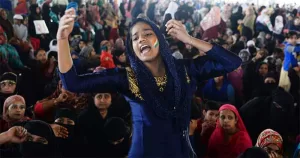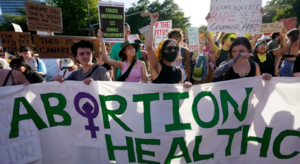To
Shri Narendra Modi
The Prime Minister of India
Respected Prime Minister,
The National Federation of Indian Women, NFIW, extends its greetings to you on the occasion of the 75th year of India’s independence.
NFIW is one of the leading women’s organizations in the country, found in 1954 under the leadership of Aruna Asaf Ali, Pushpamoyee Bose, Hajra Begum, Ansuya Gyanchand, Saadat Bano Kitchlew, P. Yashoda and others. Our organization continues to substantially engage with various issues and struggles of women of this country. Carrying forward the principles of equality, dignity and justice, the NFIW functions across 26 states of India.
We write to you today to express our concern and misgivings regarding the decision of the Union Cabinet to increase the minimum legal age of marriage of women from 18 to 21 years. While on the face of it this proposed law seems quite pro-women and progressive, however it is our assessment that this form of State action does not align with its stated intent of empowerment of women, particularly as nutrition, education, maternal and infant mortality levels need to be improved. These issues cannot be remedied by merely increasing the legal age of marriage.
We firmly believe that the questions of maternal and infant mortality, driven by anemia and malnutrition are critical problems which need to be addressed urgently and, in a concrete, scientific and rational manner. In order to truly ensure the wellbeing of women in this country; to deliver the Constitutional promise of equal and dignified citizenship, the focus must unwaveringly be upon ensuring higher education, access to nutrition and quality healthcare; and employment and safe workplace to the young women of India. All these are core social sectors which have a direct impact on the overall well-being of women. However, most unfortunately these are sectors that are being aggressively privatized making them even more inaccessible especially to the women belonging to the most marginalized and vulnerable sections of the society.
There are deep contradictions between stated objectives and structural provisions, which disable quality education, especially for the girl child and those from the margins of the society. Access to higher level education is almost impossible for these categories. Rural government schools with classes up to the 10th standard, are running with inadequate teaching staff. Lakhs of girl students are suffering due to these structural deficiencies and have not been able to reach even 10th standard.
The non-implementation of existing legislations, has created hurdles in the path of empowerment of women. The state of the economy today marked with job-less and job-loss growth is severely affecting the possibility of economic empowerment of young women.
There are huge problems of inequality in access to resources and to justice. Increasing the legal age of marriage as a tool to control population will lead to targeting a community and most deprived sections of society. It will also surely impact a young woman’s Constitutional right to choose.
Prime Minister, your government also needs to discuss the implementation of the National Food Security Act, which is targeted and linked with the AADHAAR, which has led to large scale denial and exclusion. The NFHS-5 shows an alarming rate of anaemia, stunting, wasting and underweight children under 5 years. Parliament should also discuss the ICD Scheme, launched in 1975, aimed at improving the nutritional and health status of children in the age-group 0-6 years, to reduce mortality, morbidity, malnutrition and school dropout, to reach out to SC/ST and addressing interrelated needs of the young children and girls for a gender sensitive life cycle approach, which is right now being scuttled by constantly reducing the budgetary allocations. The Food Security Act should be further strengthened and universalized, with all essential commodities provided at lower prices.
Statistics, research and innumerable studies have linked access to social benefits and services as key support for women’s empowerment. Foregrounded upon this reality, raising the permissible legal age of marriage is hardly a solution towards the benefit of women. It is the critical sectors of health, education, employment that need to be focused upon.
NFIW is of the view that the Union government and the Parliament should urgently discuss why, in spite of progressive legislation like the Prohibition of Child Marriage Act 2006, passed by Parliament, 23% of marriages (of girls) are of below 18, and even below 15 years in India. The Dowry Act is seldom invoked. The Parliament and the government need to review the reasons why legislation cannot be used by women in need of protection and justice. NFIW firmly believes that sincere and truthful correction of these issues will lead to increase in age at marriage voluntarily to a great extent. It will turn the population of girls into a strong one and enable them to contribute to the growth and wellbeing of the Nation. NFIW also appeals to you to fix accountability for the non-implementation of the existing laws for women and children.
To ensure gender equality, the passage of a Women Reservation Bill will be a huge step forward. When there is space for women in the highest decision-making processes and bodies like Parliament and State Legislatures, it will enable them to deliberate and participate fruitfully in the formulation of legislations that will truly benefit women in particular and the society at large. The parliament today has a paltry 14% women. We firmly believe that the government instead of investing itself in controlling and dictating women’s life and choices should rather deliver the long-standing demand of the women of this country for substantial representation in the Parliament in order to ensure socio-political justice.
Therefore, we appeal that in order to achieve holistic empowerment of women the way forward is not by increasing the legal age of marriage for women, rather political will and social commitment has to be shown by the government through ensuring the implementation of existing laws in its letter and spirit.
Thanking you,
With regards,
Yours Sincerely,
Aruna Roy, President; and Annie Raja, General Secretary
(Courtesy: Countercurrents.org.)




